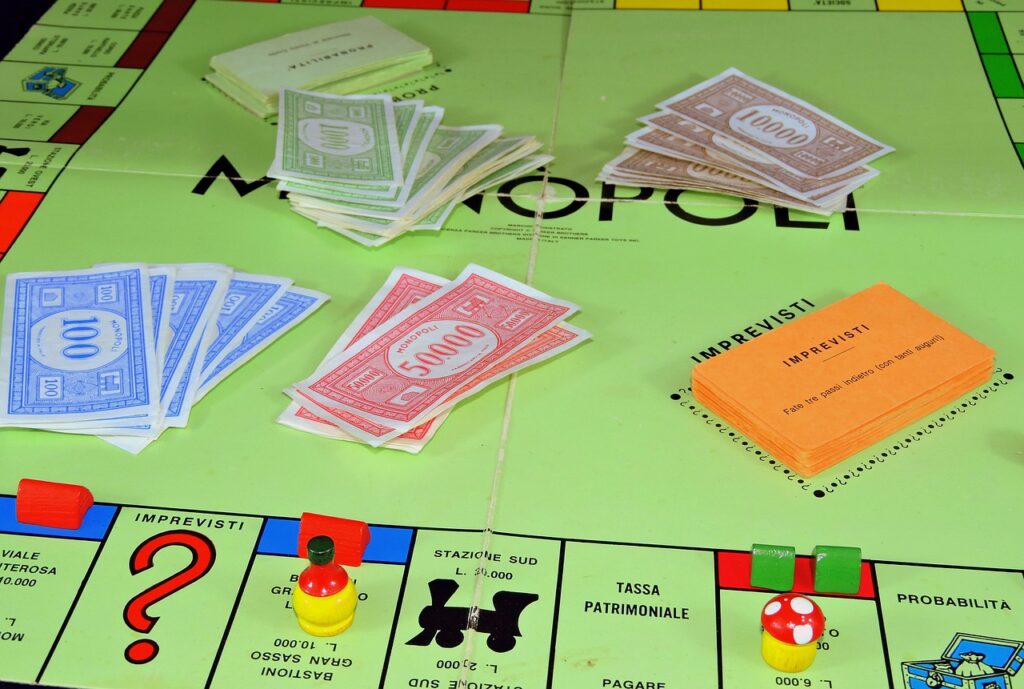When can you buy houses in Monopoly? – Best Time
Monopoly, a classic board game, hinges on strategy, negotiation, and a touch of luck. A crucial aspect of gameplay that can greatly influence your success is purchasing houses. Understanding the optimal times and methods for buying houses in Monopoly can enhance your winning potential. Let’s explore the nuances of this process and reveal the keys to conquering the board.

Understanding the Basics: The Journey to Real Estate in Monopoly
Monopoly revolves around acquiring properties, developing them, and collecting rent from opponents who land on your spaces. The ultimate goal is to bankrupt your opponents through strategic property development.
Monopoly 101: A Quick Refresher on the Rules
Monopoly starts with each participant being given a fixed amount of cash. Players take turns rolling dice to navigate the board, buying properties when they land on unowned spaces. Should a player land on a property owned by someone else, they are required to pay rent. Additionally, the game features Chance and Community Chest cards, which can either aid or obstruct a player’s progress.

The Importance of Properties: Building Your Empire
Properties are the cornerstone of your strategy. Owning a complete color set allows you to start building houses, exponentially increasing the rent you can charge. This is where the real money is made, and understanding how to efficiently build and manage these properties is crucial.
The Road to Owning Property: Collecting the Color Sets
What Are Color Sets and Why They Matter
Color sets, or property groups, consist of two or three properties of the same color. Owning all properties in a set gives you a monopoly, hence the game’s name. This monopoly allows you to build houses, dramatically increasing the rent you can charge.
Strategies for Acquiring Color Sets Efficiently
To complete a color set, you might need to engage in trades with other players. Strategic negotiation is key here. Offering cash, other properties, or even future favors can help you secure the properties you need. Be wary of giving away too much in a trade; you want to ensure that you come out ahead in the long run.

The Pre-Requisites for Buying Houses: What You Need to Know
Owning All Properties in a Color Set
Before you can buy houses, you must own all the properties in a color set. This requirement ensures that players have a significant investment in the game before they can start developing their properties. Once you have a complete set, you can start thinking about building.
Unmortgaging Properties: Clearing Your Debts
If you’ve mortgaged any of your properties to raise funds, you’ll need to unmortgage them before you can build houses on them. This involves paying off the mortgage plus a 10% interest fee. Keeping your properties unmortgaged is crucial for maintaining your ability to develop and earn rent.
Timing Is Everything: When Can You Start Buying?
The Official Rule: Buying Houses on Your Turn
Per the official Monopoly rules, you are allowed to purchase houses either during your turn or between another player’s turns, provided you are not in jail. This flexibility enables you to strategically plan your developments according to the current state of the game.

Exceptions and Special Scenarios: Flexibility in House Purchases
There are some nuances to when you can buy houses. For example, some house rules allow for more liberal purchasing, enabling players to buy houses at any time during the game. Understanding and agreeing on these variations before starting the game can prevent disputes.
Financing Your Houses: Managing Your Monopoly Money
Balancing Property Purchases and Cash Reserves
Building houses require a significant amount of cash. It’s important to balance your spending on houses with maintaining enough cash reserves to pay rent and other expenses. Running out of money can force you to mortgage properties or sell houses, putting you at a disadvantage.
Selling Houses and Mortgaging: Raising Funds Quickly
If you find yourself short on cash, you can mortgage properties or sell houses back to the bank. Selling houses can provide immediate funds but at a loss, since houses sell for half their purchase price. Mortgaging can give you a quick cash infusion but limits your earning potential.

House Purchasing Strategies: Outbuilding Your Opponents
Gradual Growth vs. Rapid Expansion: Which Is Better?
When it comes to buying houses, players often debate whether to build gradually or expand rapidly. Gradual growth involves slowly adding houses, ensuring you always have enough cash. Rapid expansion focuses on quickly building as many houses as possible to maximize rent. Both strategies have their merits, and the best choice often depends on your current game position and cash reserves.
The Art of House Distribution: Avoiding the Three-House Trap
Distributing your houses evenly across your properties is a common strategy to avoid the “three-house trap.” In Monopoly, the fourth house on a property costs significantly more than the first three, so spreading your investments can be more cost-effective and maximize your returns.

Monopoly House Rules: How Variations Can Impact House Buying
Popular House Rules That Change the Game
Many families and groups play Monopoly with house rules that alter the official rules. Popular variations include free parking bonuses, increased starting money, or different trading rules. These variations can significantly impact the strategy around buying houses, making it essential to clarify the rules before starting the game.
Creating and Adapting House Rules for Fun and Fair Play
If you’re playing with house rules, make sure they’re fair and enjoyable for everyone. Customizing rules can add variety to the game and keep it interesting, but they should enhance rather than detract from the strategic depth of Monopoly.
Common Pitfalls and How to Avoid Them: Smart House Buying
Overextending Your Finances: Risks and Recovery
One of the biggest mistakes players make is overextending their finances by building too many houses too quickly. This can leave you vulnerable to paying high rents to opponents and force you to mortgage properties. Keeping a close eye on your cash flow and planning for potential expenses can help avoid this pitfall.

The Monopoly Housing Shortage: Dealing with Limited Houses
Monopoly has a limited number of houses available. If other players are also building, you might find it challenging to purchase the houses you need. In such cases, it can be strategic to buy houses early before your opponents do, but this requires careful cash management.
When can you buy houses in Monopoly?
In Monopoly, you can buy houses during your turn or between other players’ turns, as long as you’re not in jail. You need to own all properties within a color group (i.e., have a monopoly) before you can start purchasing houses, ensuring you have a solid investment foundation first.
What is the best time for buying properties?
The optimal time to buy properties is early in the game whenever you land on unowned spaces. Acquiring a variety of properties increases your chances of completing color sets, but balance this with maintaining enough cash to cover rent and other expenses.
How can you buy properties in Monopoly?
You can buy properties by landing on unowned spaces and purchasing them for the listed price, or by winning them in an auction if the initial player declines to buy. Additionally, you can acquire properties through trades with other players, negotiating terms involving cash, other properties, or future considerations.
What are the house rules for Monopoly?
House rules for Monopoly are unofficial modifications that players use to customize their games. Popular ones include the Free Parking Jackpot, where fines and taxes are collected and awarded to players landing on Free Parking, and starting with double the cash. Other variations include not auctioning unpurchased properties and shortening the game by setting a time limit and declaring the wealthiest player the winner.
Understanding when you can buy houses in Monopoly is crucial for mastering the game. By following the official rules, ensuring you own all properties in a color group, and strategically planning your purchases, you can significantly increase your chances of success. Timing your property acquisitions wisely and balancing your cash reserves are key to building a formidable empire.






